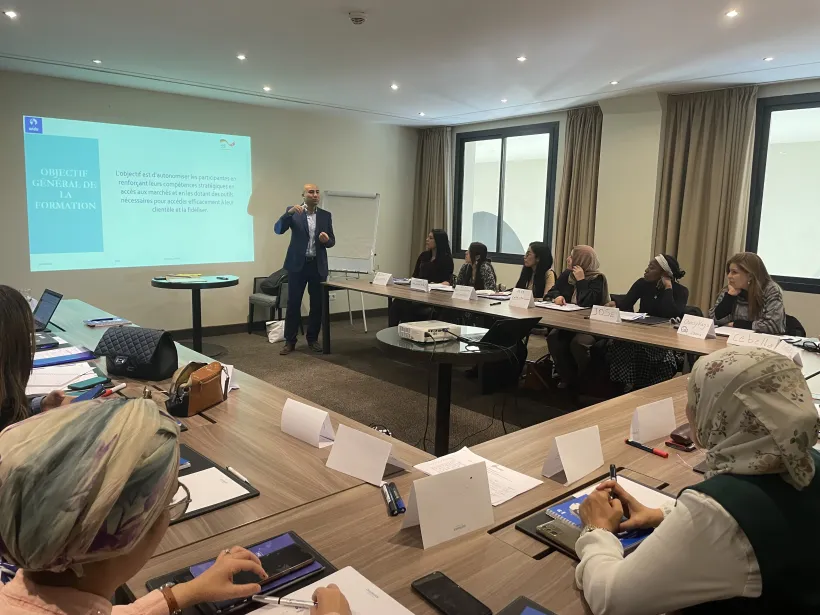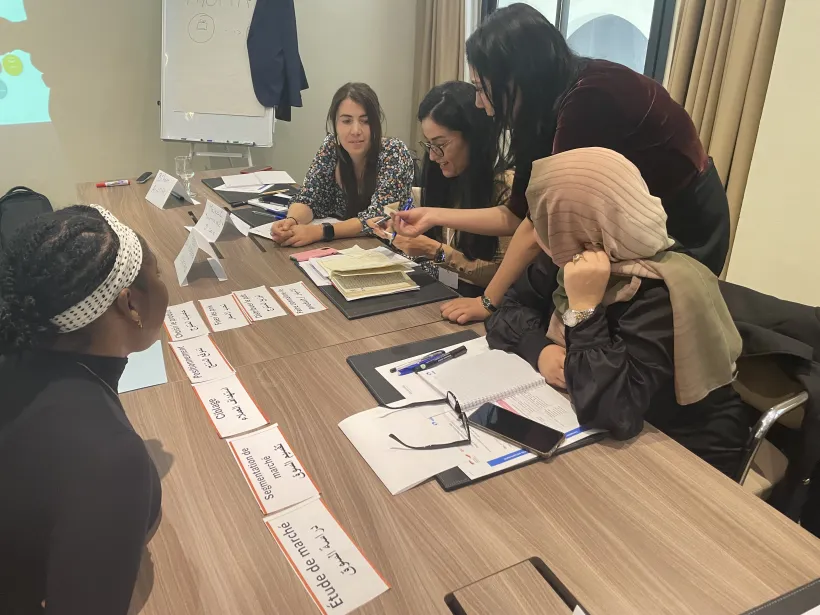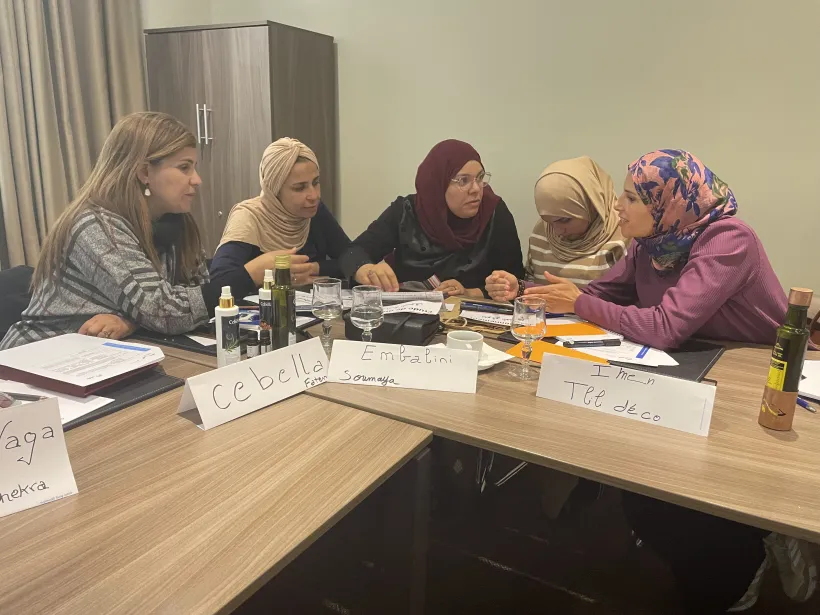Following the success of the previous year, Redstart Tunisie, the technical partner of the WIDU project in Tunisia, organized the re-edition of the Inno‘Preneurs Days from November 30 to December 1, 2023, in Tunis. Themed "Intersection", this edition brought together numerous partners and key players in the entrepreneurial ecosystem for panel discussions and workshops. The objective was to discuss sustainable economic approaches, such as social, solidarity, green, orange, and circular, to promote inclusive and sustainable entrepreneurship.
As a part of its involvement, the WIDU project, executed by GIZ in Tunisia, organized a workshop addressing women's inclusion into entrepreneurship. The session specifically centered on strategic marketing and market access for 17 Tunisian women entrepreneurs representing diverse regions of the country. Facilitated by Mr. Anis Allagui, an expert in marketing and sustainable economic models, the participants, including seven beneficiaries of the Original WIDU Grant and 10 from the #WomenCall – a funding instrument exclusively dedicated to women entrepreneurs – exchanged ideas and solutions to strategically position their products and services in the Tunisian market.
The workshop on the theme of access-to-market is part of a series of successful initiatives undertaken by the WIDU project to support women's entrepreneurship in Tunisia and Africa. A key element of these efforts is illustrated by the #WomenCall launched in July 2023, a new financial instrument by WIDU in collaboration with the WoMENA project, both implemented by GIZ in Tunisia. It aims to support women entrepreneurs, particularly in vulnerable regions of the country. Through this #WomenCall, nearly 80 entrepreneurs received financial support and encouragement in developing their entrepreneurial activities.

Exchange of Ideas on Marketing Strategies – A Continuation of Coaching Sessions Provided by the WIDU Project
A robust business model requires a clear marketing plan. Anis Allagui emphasized the importance of a clear strategy from the outset to succeed in acquiring new markets in Tunisia and internationally: "Developing a product, planning its distribution, and marketing are the royal disciplines of an entrepreneur and should never be outsourced. No one understands your business idea as well as you do. This is reflected directly in your soft skills, whether in negotiations, persuasion, or customer loyalty. That's why marketing is an essential skill."
During this session, entrepreneurs learned to identify a market, recognize its segments, and target the right audience – concepts sometimes underestimated by entrepreneurs. They also conducted a precise commercial diagnosis of their activities to develop an appropriate marketing strategy. Jamila Khlif, founder of the Rec-Inov project, explained, "We have acquired methods to better understand our position in the market. Which customers should I prioritize? Who should I target directly? Who is just an intermediary? Sorting all this out is difficult when you are at the starting point." Jamila, who needed support in her marketing strategy, applied for the Original WIDU Grant. Her participation in one of WIDU.africa's programs allowed her to benefit from a grant and three coaching sessions provided by the technical partner, Redstart Tunisie. With her coach's help, she could directly address her strategic questions to effectively tackle challenges like administrative procedures.

Barriers to Market Entry: How Female Networking Creates New Opportunities in Tunisia?
Experiences shared during the training highlighted the resilience of women entrepreneurs against gender-related obstacles. Beyond financial resource access, women more easily encounter structural constraints in administrative procedures or their social environment. The 17 women entrepreneurs shared significant experiences during this workshop in that matter.
One of the added values of this day lay in networking among women, not only as entrepreneurs but from woman to woman. Around the table, they shared ideas about moments when they perceived themselves more as disadvantaged women than ambitious entrepreneurs. "It is difficult to imagine the obstacles that women really face. When it comes to new clients, my status as a woman often becomes the main topic. My hard work, my team, and my business idea sometimes seem less important," lamented Jamila during a coffee break.
Despite the challenges discussed, many perspectives and opportunities emerged from discussions on obstacles to market access in Tunisia. For many of them, this was the first opportunity to share their personal challenges in a restricted setting as entrepreneurs. Storytelling, according to Jamila, acted like a "breath of fresh air" for motivated entrepreneurs.
Thouraya Weslati from the Shekaz project shared how she successfully exported traditional Tunisian clothes and bags to Europe using simple commercial techniques: "To arouse the curiosity of international customers, I designed labels explaining how the garment is traditionally worn." By making cultural heritage more understandable, the value for foreign customers increased. This quick but effective intervention in her business model opened the way to a larger market.

Promotion of Women Entrepreneurs in Africa, a Major Focus of the WIDU Approach
Support programs such as the #WomenCall and WIDU's training on access-to-market help overcome structural challenges women face daily in their professional fields. Since the launch of WIDU.africa in 2019, nearly 2,500 women entrepreneurs have been supported by WIDU in the six African countries participating in the program. This is a significant step toward greater inclusion of women in African and Tunisian entrepreneurship.